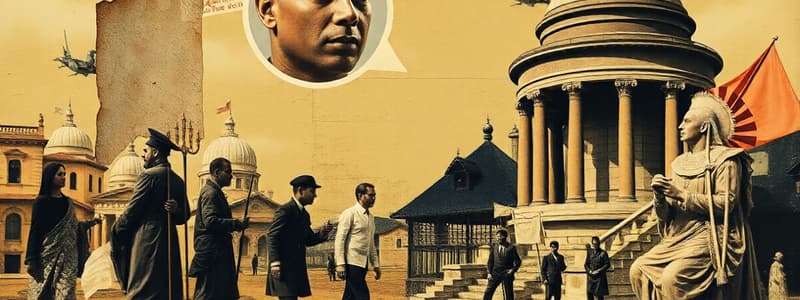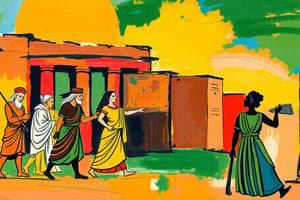Podcast
Questions and Answers
What is a defining characteristic of the Prehistoric Era?
What is a defining characteristic of the Prehistoric Era?
- Development of major religions
- Emergence of writing systems
- Absence of written records
- Cultural revival in art and science (correct)
During which period did the Black Death significantly affect European society?
During which period did the Black Death significantly affect European society?
- Classical Antiquity
- Ancient History
- Middle Ages (correct)
- Early Modern Period
Which of the following was a major development during the Renaissance?
Which of the following was a major development during the Renaissance?
- Cuneiform writing
- Emergence of the Crusades
- Scientific Revolution (correct)
- Feudalism
What does historiography study?
What does historiography study?
Which major civilization is associated with cuneiform writing?
Which major civilization is associated with cuneiform writing?
Which of the following best represents the theme of Politics and Governance in history?
Which of the following best represents the theme of Politics and Governance in history?
Which period witnessed the Age of Exploration?
Which period witnessed the Age of Exploration?
What does comparative history analyze?
What does comparative history analyze?
Flashcards are hidden until you start studying
Study Notes
Overview of History
- Definition: The study of past events, particularly human affairs.
- Importance: Understanding societal development, cultural evolution, and lessons from past mistakes.
Key Periods in History
-
Prehistoric Era
- Characterized by the absence of written records.
- Use of tools, cave paintings, and early human settlements.
-
Ancient History (c. 3000 BCE - 500 CE)
- Emergence of writing systems (cuneiform, hieroglyphics).
- Major civilizations: Mesopotamia, Ancient Egypt, Indus Valley, Ancient China, Mesoamerica.
-
Classical Antiquity (c. 500 BCE - 500 CE)
- Rise of empires: Greece (philosophy, democracy), Rome (law, engineering).
- Development of major religions: Buddhism, Christianity, Hinduism.
-
Middle Ages (c. 500 - 1500 CE)
- Feudalism in Europe, Islamic Golden Age, and the Crusades.
- Black Death and its impact on European society.
-
Renaissance (c. 14th - 17th Century)
- Cultural revival in art, literature, and science.
- Humanism and the beginning of modernity.
-
Early Modern Period (c. 1500 - 1800)
- Age of Exploration: Columbus, Magellan, and the colonization of the Americas.
- Scientific Revolution and Enlightenment ideals.
-
Modern History (c. 1800 - Present)
- Industrial Revolution and the rise of multiple political ideologies (liberalism, socialism).
- World Wars, the Cold War, and global interconnectedness.
Study of History
- Historiography: The study of historical writing and methodologies.
- Primary vs. Secondary Sources:
- Primary: Original documents, artifacts, and eyewitness accounts.
- Secondary: Analyses, interpretations, and summaries of primary sources.
Major Themes in History
- Conflict and Warfare: Causes, consequences, and transformations.
- Economics and Trade: The development of trade systems and economic theories.
- Culture and Society: Art, religion, and family structures throughout time.
- Politics and Governance: Forms of government, political thought, and revolutions.
Historical Methods
- Chronological Framework: Establishing timelines to understand progression.
- Comparative History: Analyzing similarities and differences between different cultures or periods.
- Oral History: Collecting and analyzing spoken accounts of historical events.
Important Historical Figures
- Alexander the Great: Conqueror who created a vast empire.
- Julius Caesar: Roman general and statesman pivotal in the rise of the Roman Empire.
- Mahatma Gandhi: Leader of the Indian independence movement through nonviolent civil disobedience.
- Nelson Mandela: Anti-apartheid revolutionary and South Africa’s first black president.
Notable Historical Events
- Fall of the Berlin Wall (1989): Symbolized the end of the Cold War.
- American Revolution (1775-1783): Established the United States independence from Britain.
- French Revolution (1789-1799): Led to radical social and political changes in France.
Conclusion
- History is an intricate tapestry of events, influences, and outcomes that shape the human experience.
- Studying history helps to contextualize current events and informs future decisions.
History Definition & Importance
- Definition: The study of past events, particularly human affairs.
- Importance: Understanding societal development, cultural evolution, and lessons from past mistakes.
Key Periods in History
- Prehistoric Era: Characterized by the absence of written records. Tools, cave paintings, and early human settlements marked this period.
- Ancient History (c. 3000 BCE - 500 CE): Emergence of writing systems like cuneiform and hieroglyphics. Rise of major civilizations including Mesopotamia, Ancient Egypt, Indus Valley, Ancient China, and Mesoamerica.
- Classical Antiquity (c. 500 BCE - 500 CE): Rise of empires like Greece (known for its philosophy and democracy) and Rome (known for its law and engineering). This period also saw the development of major religions like Buddhism, Christianity, and Hinduism.
- Middle Ages (c. 500 - 1500 CE): Characterized by feudalism in Europe, the Islamic Golden Age, and the Crusades. The Black Death significantly impacted European society during this time.
- Renaissance (c. 14th - 17th Century: A cultural revival in art, literature, and science. Humanism emerged, marking the beginning of modernity.
- Early Modern Period (c. 1500 - 1800): Age of Exploration led by figures like Columbus and Magellan, leading to the colonization of the Americas. The Scientific Revolution and Enlightenment ideals also emerged during this period.
- Modern History (c. 1800 - Present): Industrial Revolution and the rise of political ideologies including liberalism and socialism. This period also witnessed World Wars, the Cold War, and increasing global interconnectedness.
Study of History
- Historiography: The study of how history is written and the methodologies used.
- Primary vs. Secondary Sources:
- Primary Sources: Original documents, artifacts, and eyewitness accounts.
- Secondary Sources: Analyses, interpretations, and summaries of primary sources.
Major Themes in History
- Conflict and Warfare: Focuses on the causes, consequences, and transformations resulting from conflicts and war.
- Economics and Trade: Explores the development of trade systems and economic theories throughout history.
- Culture and Society: Examines art, religion, and family structures across different periods and cultures.
- Politics and Governance: Studies forms of government, political thought, and revolutions throughout history.
Historical Methods
- Chronological Framework: Establishing timelines to understand the progression of events.
- Comparative History: Analyzing similarities and differences between different cultures or periods.
- Oral History: Collecting and analyzing spoken accounts of historical events.
Important Historical Figures
- Alexander the Great: A conqueror who created a vast empire.
- Julius Caesar: Roman general and statesman pivotal in the rise of the Roman Empire.
- Mahatma Gandhi: Leader of the Indian independence movement through nonviolent civil disobedience.
- Nelson Mandela: Anti-apartheid revolutionary and South Africa’s first black president.
Notable Historical Events
- Fall of the Berlin Wall (1989): Symbolized the end of the Cold War.
- American Revolution (1775-1783): Established the United States independence from Britain.
- French Revolution (1789-1799): Led to radical social and political changes in France.
Conclusion
- History is a complex tapestry of events, influences, and outcomes that shape the human experience.
- Studying history helps to contextualize current events and informs future decisions.
Studying That Suits You
Use AI to generate personalized quizzes and flashcards to suit your learning preferences.




